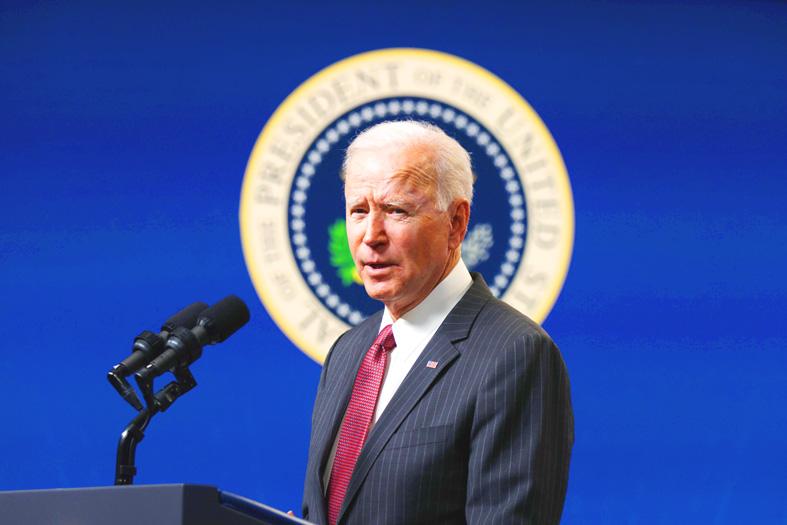Taiwan expressed its thanks to US President Joe Biden after he raised concerns with Chinese President Xi Jinping (習近平) about China’s increased pressuring of Taiwan, Presidential Office spokesperson Xavier Chang (張惇涵) said yesterday.
Biden and Xi held their first phone call as national leaders yesterday, during which Biden brought up concerns related to Taiwan, Hong Kong and human rights.
The White House said in a statement: “President Biden underscored his fundamental concerns about Beijing’s coercive and unfair economic practices, crackdown in Hong Kong, human rights abuses in Xinjiang and increasingly assertive actions in the region, including toward Taiwan.”

Photo: AFP
Chang said that Taiwan, as a member of the international community, would continue to foster close relations and cooperation with like-minded nations, such as the US, and contribute to prosperity and stability in the Indo-Pacific region.
Separately, Ministry of Foreign Affairs spokeswoman Joanne Ou (歐江安) thanked the Biden administration for its continued support of Taiwan, and its emphasis on peace and stability across the Taiwan Strait.
The ministry is committed to maintaining close communication with the US, and would continue efforts to deepen Taiwan-US collaboration on economic, political and security issues, she said.
The Biden administration has stressed that the US is committed to upholding the Taiwan Relations Act and the “six assurances,” Ou said, adding that Taiwan would continue to work with the administration to foster prosperity and peace in the region.
The “six assurances” were given by then-US president Ronald Reagan in 1982, and include pledges not to set a date for ending arms sales to Taiwan, not to hold prior consultations with China regarding arms sales to Taiwan, and not to play the role of mediator between Taiwan and China.
Meanwhile, the Chinese Ministry of Foreign Affairs said that Xi told Biden that confrontation between the US and China would be “disastrous” for both countries and the world, and said that the two countries should “re-establish various dialogue mechanisms, read each other’s policy intentions accurately, and avoid misunderstanding and miscalculation.”
Xi told Biden that Taiwan and Hong Kong are issues that “concern China’s sovereignty and territorial integrity,” and that the US should respect China’s core interests and “act prudently,” China’s foreign ministry said.
Democratic Progressive Party Legislator Lo Chih-cheng (羅致政) said that he found it significant that the White House readout of the call did not mention pursuing interests common to the US and China, adding that it stressed that Biden is committed to pursuing “practical, results-oriented engagements when it advances the interests of the American people and those of our allies.”
This means that US-China ties would move toward conditional and results-oriented engagements, said Lo, who also serves as the DPP’s international affairs director.
Chinese Nationalist Party (KMT) Legislator Charles Chen (陳以信), a member of the Legislative Yuan’s Foreign Affairs and National Defense Committee, said that the call showed that the US’ China policy would move from an antagonistic approach to “coopetition” — a combination of “competition” and “cooperation.”
That should result in calmer US-China ties, Chen said, adding that Biden laid down markers regarding Taiwan and other issues, and that the US criticized China for becoming increasingly assertive.
Additional reporting by AFP

A Chinese aircraft carrier group entered Japan’s economic waters over the weekend, before exiting to conduct drills involving fighter jets, the Japanese Ministry of Defense said yesterday. The Liaoning aircraft carrier, two missile destroyers and one fast combat supply ship sailed about 300km southwest of Japan’s easternmost island of Minamitori on Saturday, a ministry statement said. It was the first time a Chinese aircraft carrier had entered that part of Japan’s exclusive economic zone (EEZ), a ministry spokesman said. “We think the Chinese military is trying to improve its operational capability and ability to conduct operations in distant areas,” the spokesman said. China’s growing

Nine retired generals from Taiwan, Japan and the US have been invited to participate in a tabletop exercise hosted by the Taipei School of Economics and Political Science Foundation tomorrow and Wednesday that simulates a potential Chinese invasion of Taiwan in 2030, the foundation said yesterday. The five retired Taiwanese generals would include retired admiral Lee Hsi-min (李喜明), joined by retired US Navy admiral Michael Mullen and former chief of staff of the Japan Self-Defense Forces general Shigeru Iwasaki, it said. The simulation aims to offer strategic insights into regional security and peace in the Taiwan Strait, it added. Foundation chair Huang Huang-hsiung

PUBLIC WARNING: The two students had been tricked into going to Hong Kong for a ‘high-paying’ job, which sent them to a scam center in Cambodia Police warned the public not to trust job advertisements touting high pay abroad following the return of two college students over the weekend who had been trafficked and forced to work at a cyberscam center in Cambodia. The two victims, surnamed Lee (李), 18, and Lin (林), 19, were interviewed by police after landing in Taiwan on Saturday. Taichung’s Chingshui Police Precinct said in a statement yesterday that the two students are good friends, and Lin had suspended her studies after seeing the ad promising good pay to work in Hong Kong. Lee’s grandfather on Thursday reported to police that Lee had sent

A Chinese ship ran aground in stormy weather in shallow waters off a Philippines-controlled island in the disputed South China Sea, prompting Filipino forces to go on alert, Philippine military officials said yesterday. When Philippine forces assessed that the Chinese fishing vessel appeared to have run aground in the shallows east of Thitu Island (Jhongye Island, 中業島) on Saturday due to bad weather, Philippine military and coast guard personnel deployed to provide help, but later saw that the ship had been extricated, Philippine navy regional spokesperson Ellaine Rose Collado said. No other details were immediately available, including if there were injuries among